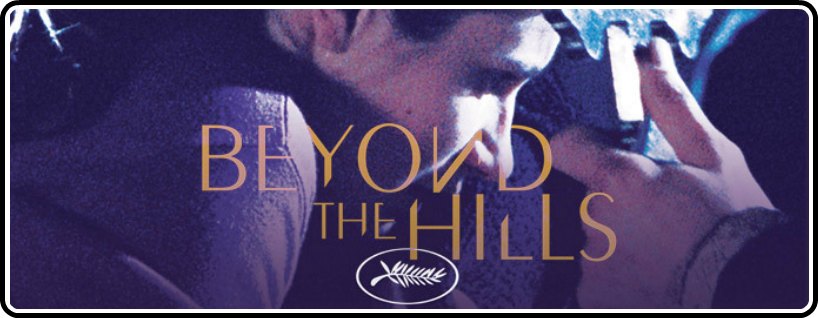Over the last decade or so, the film world has seen very few “revolutions” or “new waves,” but one country that has seen its cinematic landscape become arguably the most evocative and fruitful for cinephiles across the globe is that of Romania.
Sparked by films like Police, Adjective and even one of the earliest attributed films, Cristi Puiu’s Cigarettes And Coffee, The Romanian New Wave has become the breeding ground for a new rise in naturalism and some of the most thrillingly dense pieces of art the film world has seen.
And one of its biggest names has returned with yet another breathtaking piece of art.
Beyond The Hills sees the return of 4 Months, 3 Weeks and 2 Days director Cristian Mungiu, and it’s a welcome return as he hits on all cylinders with this lush examination of life, love, loss and so very much more.
Oddly simplistic in its plot, Beyond The Hills tells the story of two young women who have grown in distinctly different ways. Voichita (Cosmina Stratan) is a young girl who has joined a convent in Romania while her friend Alina (Cristina Flutur), currently lives in Germany. Both met and grew to become friends in an orphanage, and with hints that the relationship became something far greater, Alina has come to steal back the friend that she so desperately needs and deeply loves. However, what becomes very clear is that in a world where love becomes the enemy of understanding, faith becomes the enemy of compassion in a drama that is potently affecting and visually awe-inspiring.
A startlingly bleak meditation on the necessity that is feeling “whole,” the film is entirely a definitively Romanian picture. Culminating in only 100 shots in its two-and-a-half hour runtime, the film is visually muted with earthy photography from Oleg Mutu and a plaintive camera from Mungiu as unflinching and brooding as you’d expect from a director whose closest creative kin is a director like Bela Tarr. Featuring as clean a frame as you’ll find, the film is a tone poem about the human relationship to faith, and it features the visual key of Romanian cinema: naturalism in every possible aspect of that word.
Performance wise, the film is moving. Stratan and Flutur are absolutely fantastic, and are even better in the moments they share together. Both deeply troubled by the past they have lived, a past full of rejection and neglect, they have gone about overcoming their past in opposite ways. Stratan has become a madam of the cloth, and isn’t quite sure of what her faith means, but just knows that she is fully committed to her beliefs. Flutur’s character has gone the opposite way, acting out and running away from her foster family in search of the one person she truly loves. This tale is a sad and affecting one, and one that truly comes alive when these two share the screen. Their love feels mutual and real, and yet there is a sense of sadness and melancholy that makes this piece deeply powerful. Valeriu Andruita is equally great here as the head priest, giving the film an oddly dry sense of life and humor, often times being a scolding father figure while also scoffing at some silly superstitions of the nuns he lives with.
Clocking in at right around 150 minutes in length, the film does feel a tad overlong, and the lengthy takes add to an oddly singular sense of pace that for those not familiar with this type of drama. Also, with the themes being so heavily pertaining to religion and faith, those who find that discussion to be either not intriguing or slightly a bit too close to home, this picture may turn one off from the very beginning.
However, with the likes of directors Abbas Kiarostami and Olivier Assayas releasing new pictures early on in 2013, Mungiu’s film may be the most emotionally resonant and intellectually stimulating pieces of cinema you’ll see early on in this new year. Kiarostami is a perfect comparison as both Beyond The Hills and Like Someone In Love take a plaintive look at isolation, but with Mungiu’s eyes set to both the heavens and the people below, Beyond The Hills is yet another piece of evidence proving that Romania may very well have the most fruitful cinematic landscape of any country on this very planet. An absolute stunner of emotionally devastating proportions.




![Bergman Island (The Criterion Collection) [Blu-ray]](https://criterioncast.com/wp-content/uploads/2022/11/bergman-island-the-criterion-collection-blu-ray-400x496.jpg)
![This Is Not a Burial, It’s a Resurrection (The Criterion Collection) [Blu-ray]](https://criterioncast.com/wp-content/uploads/2022/11/this-is-not-a-burial-its-a-resurrection-the-criterion-collection-blu-ray-400x496.jpg)
![Lars von Trier's Europe Trilogy (The Criterion Collection) [The Element of Crime/Epidemic/Europa] [Blu-ray]](https://criterioncast.com/wp-content/uploads/2022/11/lars-von-triers-europe-trilogy-the-criterion-collection-the-element-of-400x496.jpg)
![Imitation of Life (The Criterion Collection) [Blu-ray]](https://criterioncast.com/wp-content/uploads/2022/11/imitation-of-life-the-criterion-collection-blu-ray-400x496.jpg)
![The Adventures of Baron Munchausen (The Criterion Collection) [4K UHD]](https://criterioncast.com/wp-content/uploads/2022/11/the-adventures-of-baron-munchausen-the-criterion-collection-4k-uhd-400x496.jpg)
![Cooley High [Criterion Collection] [Blu-ray] [1975]](https://criterioncast.com/wp-content/uploads/2022/11/cooley-high-criterion-collection-blu-ray-1975-400x496.jpg)